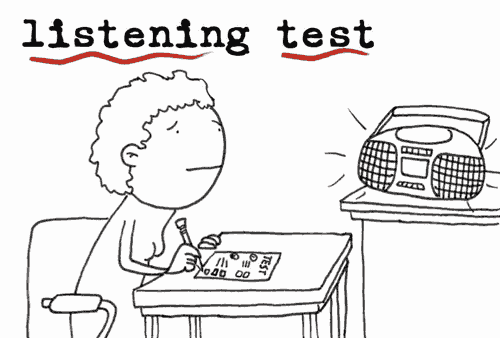#bestieltsclassesnearme #eduvoygerjaipur #cheapestieltsclasses #ieltslisteningteststrategy
IELTS Listening Test Prep Strategy for Beginners
Table of contents
• Introduction • Getting Familiar with the Exam Format • Developing Listening Skills • Tips for the Day of the IELTS Listening Test • Common Listening Mistakes to Avoid • Practice Tests and Mock Exams • Conclusion
Introduction
Welcome future IELTS test-takers! So, you’re wondering what the fuss is all about with IELTS Listening Test? It’s just listening, right? Wrong. The IELTS Listening Test is not just about listening, but about understanding the context of a conversation and answering questions based on it. It’s easy to underestimate the significance of this test, but it is undeniably crucial for your overall IELTS score. To excel in the IELTS Listening Test, first and foremost, you need to understand the format of the test, the common types of questions asked, and learn some general tips and tricks to help you succeed. Don’t worry, we’ve got you covered. Keep reading to learn more!
Getting Familiar with the Exam Format
Ah, the IELTS Listening Test. The part of the exam that always made me sweat (and not in a good way). But fear not, dear test taker, for with a little preparation, you can go into the test with confidence. First things first, let's get familiar with the exam format. The IELTS Listening Test is comprised of four different sections, each with its own set of questions. You'll listen to a variety of recordings, including some conversations, monologues, and even presentations. It's all about testing your ability to understand the language in real-life situations. Now, onto the types of questions. There are a few different formats you might encounter during the test, including multiple choice, matching, and sentence completion. And let's not forget the dreaded "gap-fill" questions, where you have to fill in the blanks with missing words. Don't worry, we'll cover strategies for these later on. The key to success here is practice, practice, practice. The more you expose yourself to the different types of questions and recordings, the more comfortable you'll feel on the day of the test. So, let's dive into the strategies for developing those all-important listening skills.
Developing Listening Skills
Developing Listening Skills: Alright, now that you’ve familiarized yourself with the IELTS listening test, it’s time to develop those listening skills. Firstly, let’s talk about active listening skills. The trick here is to focus on the speaker and nod your head like your life depends on it. Don’t worry, the speaker isn’t in the room, so there’s no need to feel silly. Active listening is all about engaging with the speaker, processing what they’re saying, and asking questions if necessary. Next, let’s move on to the importance of practice. The key here is to practice like it’s the real thing. You wouldn’t go into a marathon without training, would you? Yeah, I didn’t think so. So, why treat the IELTS listening test any differently? Practice with genuine IELTS listening materials and try to replicate the test day environment as much as possible. You’ll be amazed how much it helps. Finally, let’s talk about online practice resources. These days, you don’t even have to leave your house to practice for this test. There are countless online resources available that can help you build your skills, ranging from helpful YouTube videos to genuine IELTS listening materials. Take advantage of them and thank me later. Remember, developing listening skills isn’t rocket science. Just be an active listener, practice like there’s no tomorrow, and take advantage of the many online resources available to you.
Tips for the Day of the IELTS Listening Test
Okay, so the day of the IELTS listening test is finally here! You may have a few butterflies in your stomach, but don't worry, that's perfectly normal. Here are some tips to help you make the most of the day: First and foremost, arrive early at the test center. You don't want to be rushed and flustered before the test even starts. Plus, getting there early gives you time to calm your nerves and mentally prepare. During the test, use your time effectively while listening. Remember, you only get to hear each section once, so it's important to focus and stay attentive. Don't let your mind wander or get distracted. If you miss an answer, don't dwell on it. Just move on and try your best on the next question. Finally, make use of answering strategies to help you tackle the test. For example, you can underline key words in the questions to help you focus on the most important information. You can also guess if you're unsure of an answer, as there are no penalties for incorrect responses. Follow these tips and you'll be well on your way to acing the IELTS listening test. Good luck!
Common Listening Mistakes to Avoid
Let's face it; we've all made mistakes during exams, even when we know the answers. When it comes to the IELTS Listening Test, there are specific mistakes that most beginners tend to make. The first mistake is misunderstanding question requirements. Some questions ask for specific details, while others require an overview of the passage. Make sure you read and understand the questions before listening to the audio. Another mistake is incorrect spelling and grammar. This can be easily avoided by practicing your spelling and grammar beforehand. Remember, it's not just your listening skills that are being tested during the IELTS Listening Test. Lastly, many students forget to check their answers. Always allocate some time to cross-check your answers for common mistakes such as spelling errors, incorrect punctuation, and incorrect answers. Your final score depends on the number of correct answers, so it's essential to be meticulous. Avoiding these common mistakes can lead to a higher score in the IELTS Listening Test.
Practice Tests and Mock Exams
So, you've been drilling your listening skills and now it's time to put all that hard work to the test. But before you leap right in, you'll want to make sure you're as prepared as possible. That's where mock exams come in. Mock exams, or practice tests, are a key element of IELTS Listening Test prep. These simulated exams give you a chance to test your skills in real exam conditions, helping to identify strengths and weaknesses, and giving you the opportunity to fine-tune your approach to various sections of the test. One of the main benefits of mock exams is that they simulate real test conditions, including the time constraints, format, and question types. This way you can tune your mind towards handling the pressure and the format of the IELTS Listening Test. Additionally, you may feel more confident and less nervous during the actual test after having completed one or more practice tests. Many official IELTS test sites, as well as various online test preparation websites or applications offer mock exams for free. They provide an authentic test-like experience by using previous IELTS test questions. So, make sure you take advantage of these resources to test your readiness for the real exam. Remember, mock exams are not only a great way to get good results, but they also help to reduce the stress of taking the real exam. So, take the time to practice, use mock exams and walk into the real exam with confidence!
Conclusion
You made it to the end! Remember to arrive early, utilize your time effectively, and avoid common mistakes. Practice listening, take mock exams, and use online resources to sharpen your skills. Good luck on your IELTS Listening Test!

